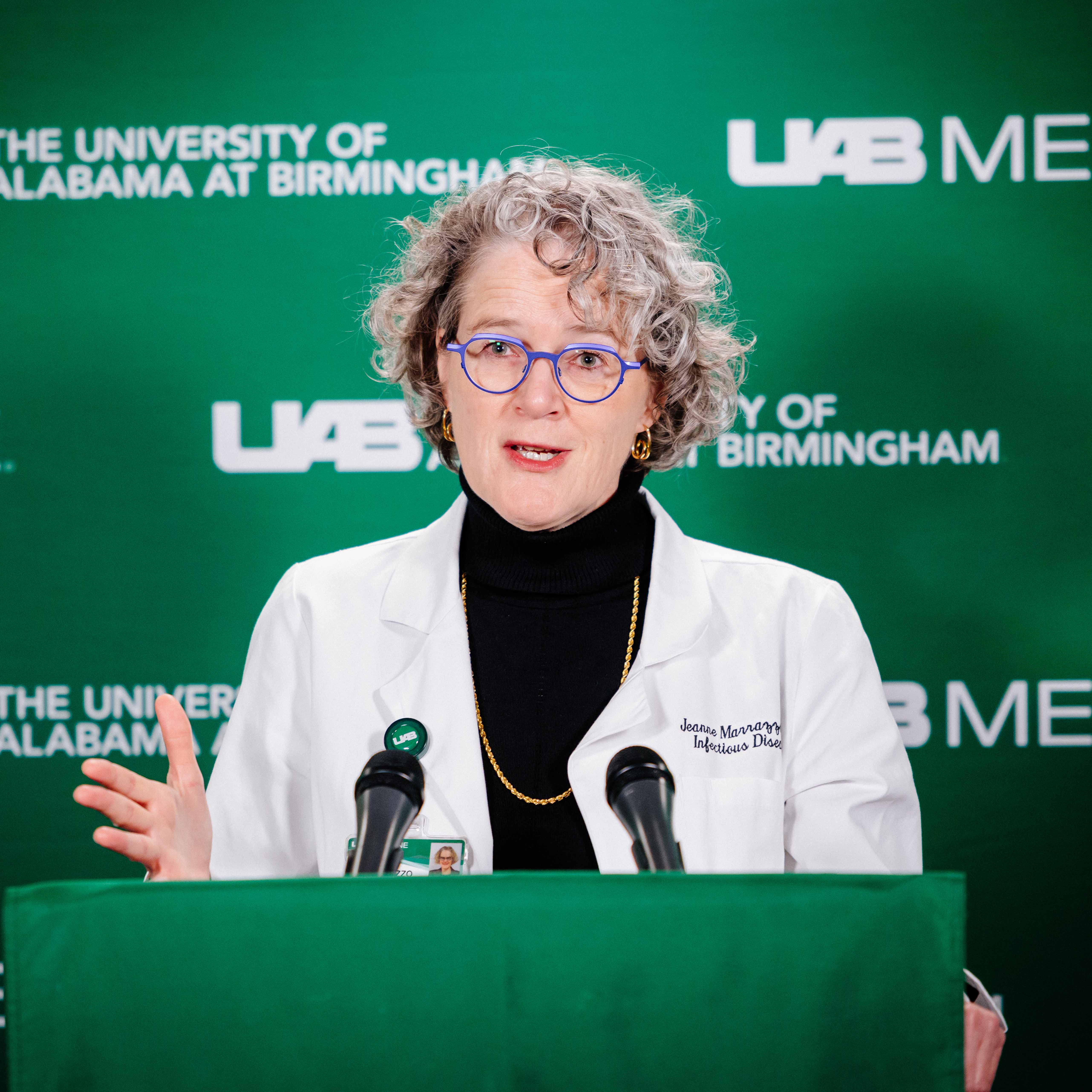 Paul Goepfert, M.D.On Monday, Aug. 23, Jeanne Marrazzo, M.D., director of the Division of Infectious Diseases, and Paul Goepfert, M.D., director of the Alabama Vaccine Research Clinic, gave an update of current COVID-19 news and answered questions live from the community and media in the latest "What's new with COVID-19?" panel.
Paul Goepfert, M.D.On Monday, Aug. 23, Jeanne Marrazzo, M.D., director of the Division of Infectious Diseases, and Paul Goepfert, M.D., director of the Alabama Vaccine Research Clinic, gave an update of current COVID-19 news and answered questions live from the community and media in the latest "What's new with COVID-19?" panel.
One of the primary topics discussed was the full FDA approval of the Pfizer-BioNTech COVID-19 vaccine. On Monday, Aug. 23, it became fully authorized for individuals 16 years of age and older. Marrazzo and Goepfert also discussed boosters, hospitalizations of pregnant women, and COVID-19 treatment—among other relevant topics.
COVID-19 in Alabama
Alabama currently has the lowest vaccination rate in the country, with only 37% of residents taking both shots of the vaccine.
People in their 30s, under 18 years old (especially young children), and pregnant women are being affected the most. These groups make up the majority of inpatients in the hospital. “This trend overall is not yielding across the country, but the gulf states are pretty much continuing to be on fire,” said Marrazzo.
Marrazzo explained that one new fact with the Delta variant is that more people are being transferred to the ICU. Majority of patients in the ICU are on a ventilator. “Overall, it’s a much more challenging surge, much more contagious,” she said.
On the FDA’s full approval of the Pfizer vaccine, Goepfert and Marrazzo were hopeful at the timing.
“It’s hard to predict what it means,” Goepfert said. “It’s great news. I think a lot of people have trusted the FDA in the past and were waiting on full FDA approval to get the vaccine.” Goepfert also explained that the vaccine was vetted carefully by the FDA, and people can be very reassured the vaccine is safe and effective.
How does the vaccine stack up against the Delta variant? Goepfert says it works extremely well in decreasing symptoms by 45-75%. Rates of protection against symptomatic COVID-19 are high. “Vaccines are working incredibly well to prevent severe disease and in keeping people out of the hospital,” he said.
“Vaccines are our best weapon against this disease. And remember, historically, they are our best weapon against infectious diseases anyway.”
Fast facts from the experts
FDA approval and vaccine booster
• Pfizer-BioNTech vaccine is fully approved for persons 16 years old and up
• Adolescents 12-15 years old can still be vaccinated
• mRNA technology allows scientists to rapidly make the vaccine
• The vaccine gives us immune cells for memory on how to fight the vaccine long-term
• ACIP is vetting boosters; will review Aug. 30 and 31
• Boosters will boost at high levels that work against the Delta variant
Pregnancy
• The vaccine is safe for pregnant women and breastfeeding women
• Pregnant women are at risk for developing severe disease from COVID-19
• OBs around Alabama are advising against vaccination, and that advice is wrong information
• Vaccines are not recommended for children under six years old
• The best way to protect children right now is through the mother’s placenta or breastfeeding
COVID-19 Treatment
• There are limited treatment modalities
• Monoclonal antibody infusion is the exact antibody that a person develops after the vaccine
• Monoclonal antibody infusion is made based on the same science as the vaccine
• It would be more ideal to have a vaccine-induced response
• Monoclonal antibody treatment requires extensive staffing and money; treatments are limited
• Currently, there is no oral pill to treat COVID-19
• Ivermectin has shown no benefit in preventing COVID-19 symptoms from worsening
• Ivermectin should be avoided for COVID-19 (it’s a de-worming agent for animals)
Immunocompromised
• The vaccine is not harmful to immunocompromised
• Live-attenuated vaccines and mRNA vaccines are different
• Live-attenuated vaccines use a weakened (or attenuated) form of the germ that causes a disease
• mRNA does not use a weakened (or attenuated) form of the germ and cannot cause COVID-19
Hospitalizations
• Majority of patients in the hospital are unvaccinated
• Emergency Rooms are overwhelmed
• Patients should seek telehealth when possible
 Jeanne Marrazzo, M.D.How to stay safe after vaccination
Jeanne Marrazzo, M.D.How to stay safe after vaccination
Both Marrazzo and Goepfert recommended not attending indoor events, especially unmasked. They each said that they would not feel comfortable attending indoor events themselves, even as fully vaccinated individuals.
They also recommended that local Alabama business owners require masking. “We don’t want businesses to get economically hit again,” said Marrazzo. Asking customers to wear a mask is the best way to avoid a COVID-19 breakout and keep business doors open.
If a person has had meaningful exposure to COVID-19, like from a person in an immediate household, they should quarantine for 4-5 days then seek a COVID-19 test. If the family members who have been exposed test negative on days 4-5 and have been vaccinated, they can return to their routines.
 Join the conversation
Join the conversation
The “What’s new with COVID-19” panel series provides opportunities to learn the latest updates on COVID-19 from infectious diseases experts and epidemiologists in an informal setting. The series offers accessible panel discussions for several audiences.
The next session is specifically for women and will discuss current hospitalizations, fertility questions about the vaccine, and how COVID-19 impacts pregnancy. It is scheduled for Sept. 1 at noon and is open to the general public. Hear from Jessica Grayson, M.D., Jodie Dionne-Odom, M.D., and Audra Williams, M.D.
Another panel specifically for health care providers will be offered Monday, Sept. 13 at 6:30 a.m. Special guests Sonya Heath, M.D., and Turner Overton, M.D., will speak to Alabama physicians and providers.